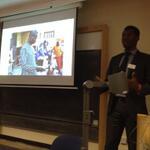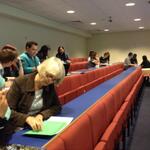WHY GET INVOLVED IN HEALTH INFORMATION WEEK 2021?
 Friday, February 19, 2021 at 1:06PM
Friday, February 19, 2021 at 1:06PM Health Information Week (5th-11th July 2021) is a multi-sector, week-long, health information campaign: it’s about raising the profile of health literacy; offering a platform for collaborative working between different partners; and reminding us all what good, reliable, health information looks like. 2020’s Health Information Week was not without its challenges (notably, a pandemic), but past participants have given us six good reasons why to get involved in Health Information Week 2021:
- A chance to support your community, and fly the flag for factual, useful health information from credible resources. Help educate people to understand the difference between good and bad health information, and why this is so important. This is perhaps the key reason to be involved in Health Information Week, this year more than ever.
- Be part of a local event that is being echoed all over the country. Retweeting support for others and being able to exchange and swap ideas while our focus is all on the same thing is very effective. It’s great to learn from others, share experiences, and feel that everyone is working towards the same goal.
- Use Health Information Week as a focal point to develop new partnerships. Hospital libraries, public libraries, school libraries, community groups, local charities, local authorities. These all have something to offer, and something to gain, from working with each other and being part of a nation-wide campaign
- Use Health Information Week to raise your profile within your organisation. Health Information Week can be a great opportunity to link up with other departments or staff groups in your organisation. For example, if you work in a hospital library, perhaps you can work with your PALS team, patient experience team, or comms? If you work in a public library, can you reach out to other services in your local authority – schools, older people outreach teams? Perhaps you’ll be able to continue the relationship after Health Information Week, and find new ways of working together.
- Promote your resources to a new audience. Health Information Week is a brilliant way to showcase your resources – be they your physical space, graphic novels, websites, leaflets, databases, book groups, even your helpful and knowledgeable staff – to a range of people. Increase your footfall and boost your visitor statistics too!
- A chance to be creative. Social media, using the #HIW2021 hashtag, is a simple, free, way to make your Health Information Week campaign fun and interesting. In the past, yoga groups, mindfulness sessions, fruit and veg giveaways, pop-up information stalls, human libraries and children’s storytelling events have all been creative ways to engage an audience.
Taking part in Health Information Week doesn’t have to be expensive or time-consuming: have a look at the Health Information Week website for ideas to take part, which range from Twitter discussions, health information poster displays and blogging, to big multi-partner, cross-city events. You’ll also find links to trusted sources of information, our blog, marketing materials, and contact details for the Health Information Week team. If it helps, each day of Health Information Week has a theme: you can use these to build your events, or you can choose a couple, or none at all – it’s up to you!
Find out more about Health Information Week 2021
Follow the Health Information Week campaign on Twitter – @Healthinfoweek



